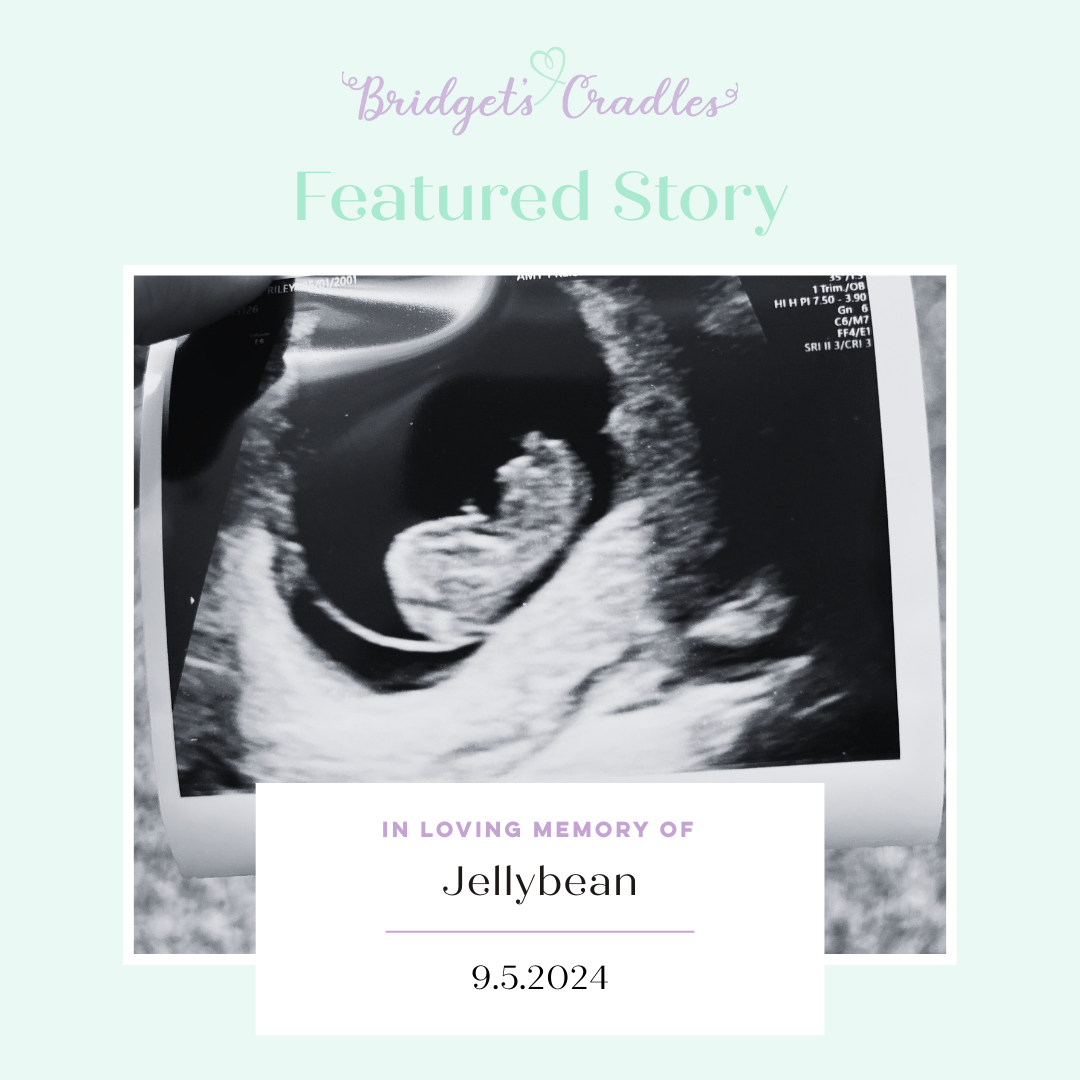Wave of Light | October 15, 2025 Register Now
registration open!
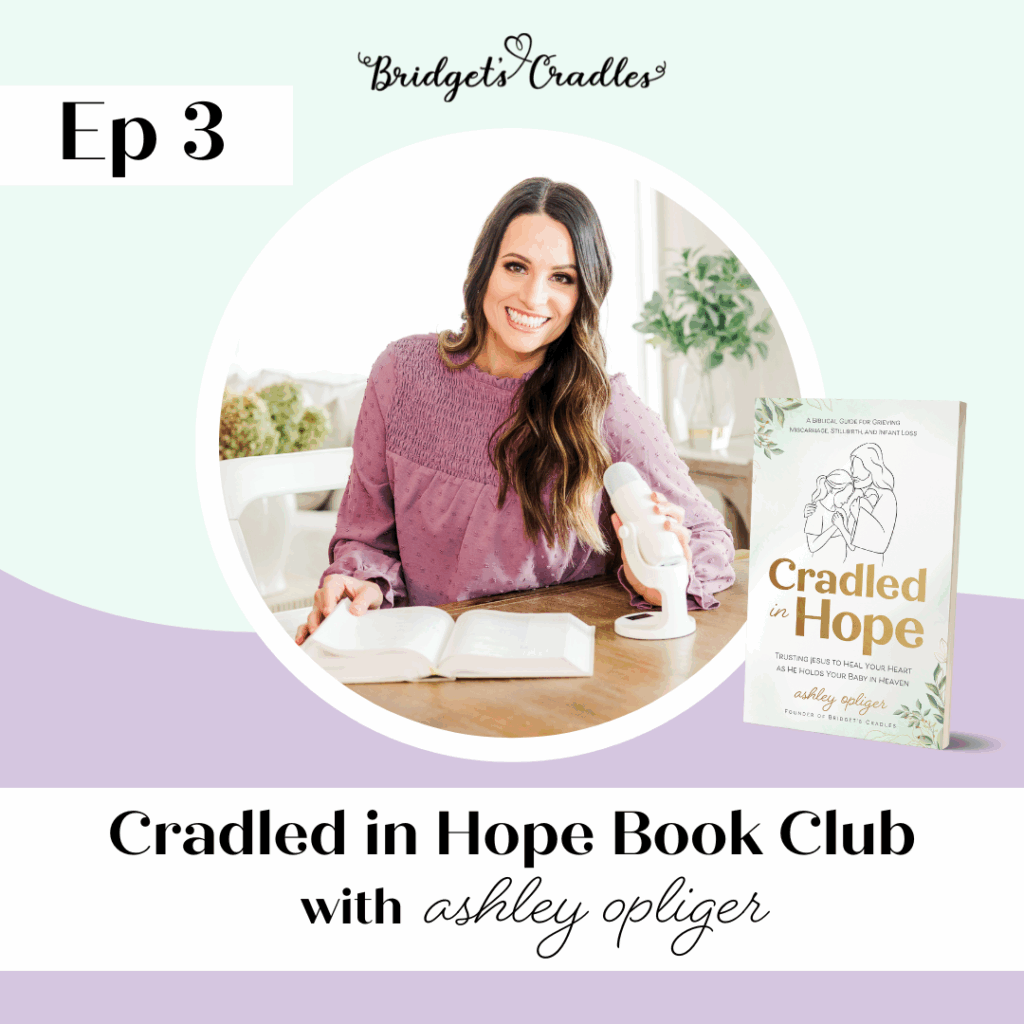
In this episode, Ashley explores one of the most tender and difficult aspects of grief: the feeling of abandonment by God. In Chapter 2, “Broken and Bleeding: When You Feel Abandoned by God,” Ashley shares her personal wrestling with faith during her pregnancy with Bridget and the raw questions that arose when her prayers went unanswered. With profound honesty and biblical truth, she unpacks how to grieve in the tension between what our hearts feel and what our heads know to be true.
This chapter is an invitation to examine your core beliefs about God, especially when pain tempts you to question His goodness or presence. Ashley shares how to shift your perspective from a feeling-driven view of God to a truth-rooted faith grounded in Scripture. Through theology, personal experience, and practical steps, she reminds us that we are not alone in our grief—Jesus is with us in the darkness, and there is light at the end of the tunnel.
In this episode, Ashley shared:
- Her personal struggle with feeling forsaken by God during her pregnancy complications with Bridget
- Why understanding original sin is key to rightly viewing the cause of suffering and baby loss
- A powerful moment of identifying with Jesus as broken and bleeding—and how our Savior relates to our physical and emotional pain
- The difference between letting your feelings shape your view of God vs. letting God’s truth reshape your feelings and circumstances
- How a right view of God leads to trust, and how a wrong view leads to mistrust
- The danger of the prosperity gospel and how it can distort our understanding of suffering and blessing
- The critical importance of reading the Bible with the right hermeneutic (interpretation method)
- Why Scripture is the balm our souls need in grief, even when it feels hard to open the Bible
Ashley invites listeners to sit honestly with their doubts, bring their questions to God, and allow His Word to bring clarity, comfort, and truth in the middle of confusion. She gently reminds us that the tunnel of grief is still dark, even with Jesus—but with Him, we are never alone, and there is light at the end.
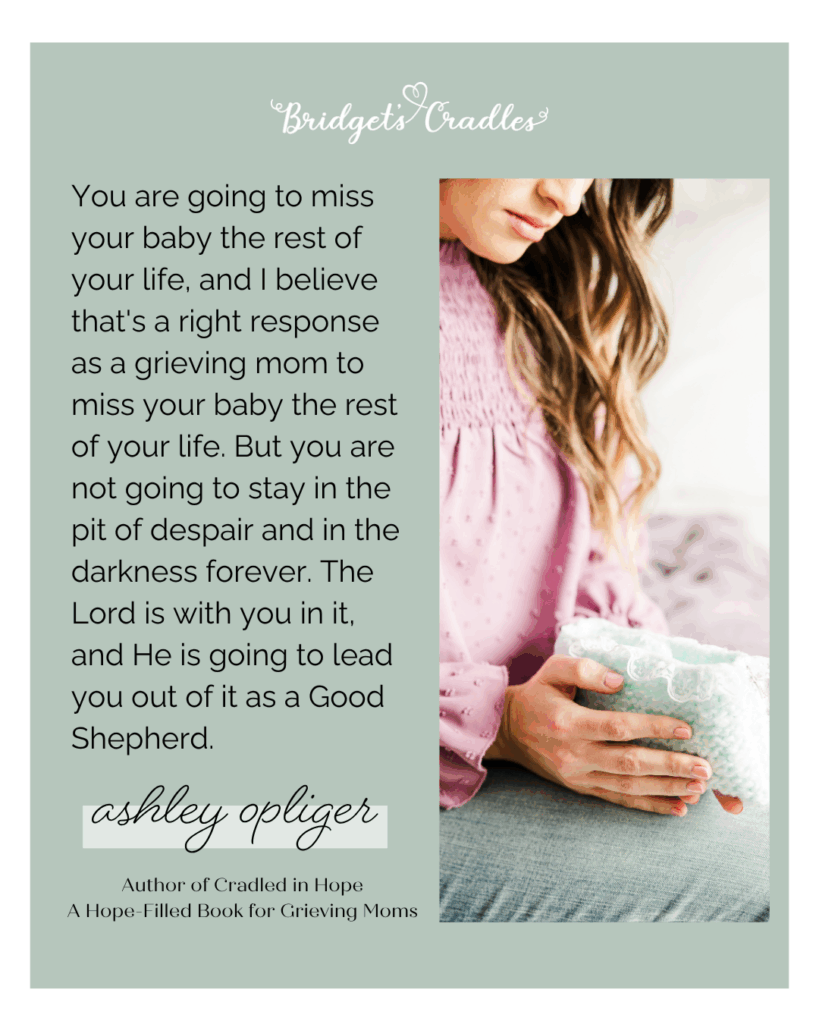
Journaling Prompt
Do you feel abandoned by God? Do you struggle with discrepancies between what your heart feels and what your head knows to be true? Reflect on which of the two belief patterns (shown in the diagrams on page 58 of the book) you tend to live from: feelings driving truth, or truth guiding feelings?
Healing Step
Start a Bible reading plan. Whether it’s the Psalms, the Gospels, or a full Bible-in-a-year plan, commit to being in God’s Word daily—even if it’s through listening. Scripture is the balm that will heal your view of God and rebuild your trust in Him. For reading plan recommendations, check the Cradled in Hope Guided Journal at ashleyopliger.com/journal.
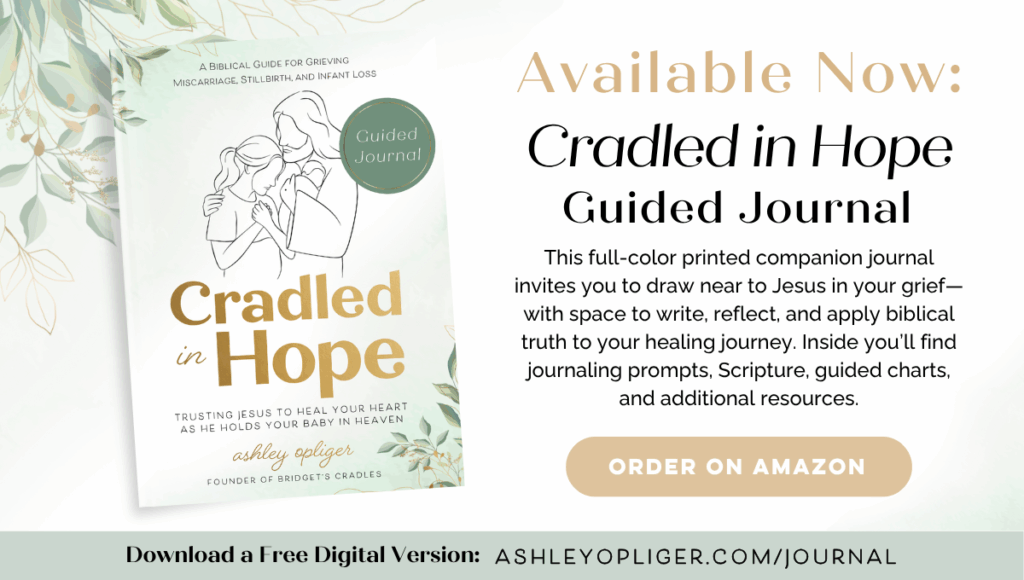
Full transcript below.

New episodes will be shared on the 1st of every month. Don’t miss a single episode…subscribe wherever you podcast!
Please also leave a review to help spread the message of hope with other grieving mommas!

MEET OUR HOST
Ashley Opliger is the Executive Director of Bridget’s Cradles, a nonprofit organization based in Wichita, Kansas that donates cradles to over 1,600 hospitals in all 50 states and comforts over 30,000 bereaved families a year.
Ashley is married to Matt and they have three children: Bridget (in Heaven), and two sons. She is a follower of Christ who desires to share the hope of Heaven with families grieving the loss of a baby.
Connect with Ashley:
Facebook /ashleyopliger
Instagram @ashleyopliger
Pinterest /ashleyopliger
www.ashleyopliger.com
Follow Bridget’s Cradles:
Facebook /bridgetscradles
Instagram @bridgetscradles
Pinterest /bridgetscradles
www.bridgetscradles.com
JOIN OUR FACEBOOK GROUP FOR GRIEVING MOMS
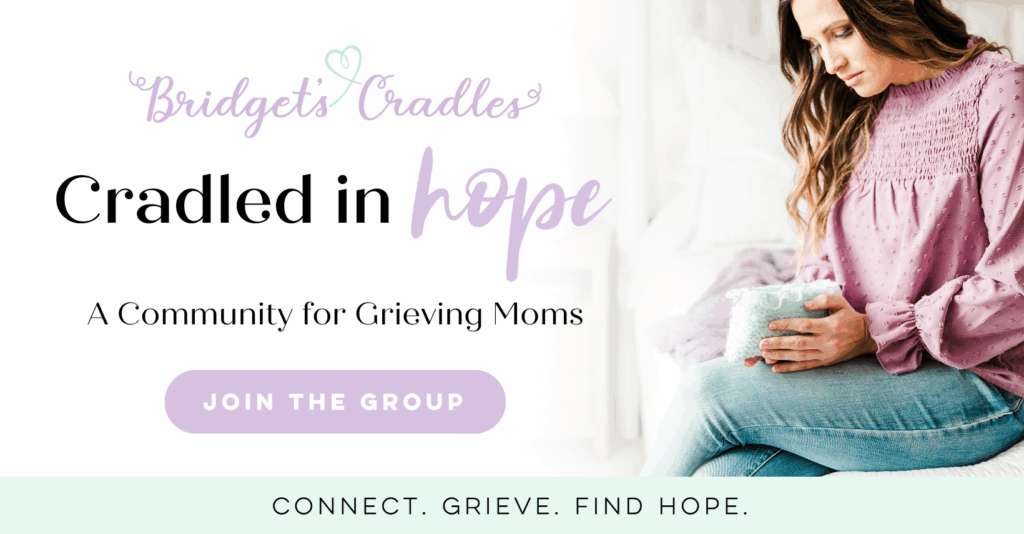
EPISODE TRANSCRIPT
Ashley Opliger: [00:00:00] Welcome to the Cradled in Hope Podcast Book Club.
I’m your host, Ashley Opliger—grieving mom, author of Cradled in Hope, and founder of Bridget’s Cradles. I’m so honored to walk with you through my book, one chapter at a time, as we navigate the heartbreak of losing a baby together.
After my daughter Bridget went to Heaven at 24 weeks, I wrestled with deep sadness and complex questions about God’s goodness. But through that grief, Jesus showed me that He not only cradles our babies in Heaven, He also holds our broken hearts here on earth.
Whether you’re reading along or simply listening in, this is a safe space for your sorrow—a place where your tears, questions, and raw emotions are welcome. Each episode, we’ll reflect on a chapter of Cradled in Hope and gently walk together from heartbreak to healing, and from pain to purpose.
My prayer is that this podcast will remind you that you are not alone in your grief and, most importantly, that it will point you to Jesus, the only One who can truly heal your heart. Through faith in Him, there is hope to see your baby again, and He will be with you every step from here to Heaven.
So wherever you are in your journey, I invite you to join me—and together, we will grieve with hope.
Let’s begin.
Ashley Opliger: [00:01:23] Hi friends. Welcome back.
Today, we are diving into Chapter Two, Broken and Bleeding: When You Feel Abandoned by God. This is one of the first chapters that I wrote when I started writing my book because feeling abandoned by God was one of the more prominent feelings I felt when I was on bed rest with Bridget and experiencing so many complications in my pregnancy.
[00:01:45] My husband and I were praying for the best outcome, but at the same time, we were going to all these doctor’s appointments, and every single time we would go, there would be more bad news and a not favorable prognosis. We would find out that she was growth-restricted or that the hemorrhage was growing larger, and all of these concerns that they had.
[00:02:04] And so throughout this, I felt like all of my prayers were not being answered. And why was God allowing my body to be so broken and for my body not to be a safe place for Bridget? And so this chapter really just addresses that feeling of, “Where are You, God? Why are You not answering my prayers?”
[00:02:22] And so let’s start by focusing on a key passage from the chapter. Today’s passage comes from page 55, and so in this section, I’m talking about the feeling of being abandoned, and I bring us to the cross when Jesus Himself cried out, “My God, My God, why have You forsaken Me,” which is in Matthew 27:46.
[00:02:46] And I said, “In His despair, Jesus questioned whether His Father had abandoned Him.”
[00:02:51] Have you ever felt this way? I know I have, especially during my pregnancy with Bridget, I felt forsaken during those 11 weeks of bleeding. I questioned whether she would survive the complications in my womb. Would God answer my prayers and save her?
[00:03:05] I was a good mother who wanted my baby. We had conceived Bridget in marriage and were committed to raising her to follow Jesus. Why would God allow this to happen to good parents who wanted nothing more than to raise their children to love Him? This brought me back to the age-old theological question: Why do bad things happen to good people?
[00:03:24] Though countless people have written books and articles on this topic, RC Sproul, Jr. had the most profound response I’ve heard: “That only happened once, and He volunteered.”
[00:03:34] And so I continue in this chapter about that topic of: Why do bad things happen to good people, and why is there suffering in this world?
[00:03:44] And obviously, that is a very big theological question, and I address that topic all throughout the book. But the general answer that I respond with in this chapter is that there really are not good and bad people. We are all sinners that have fallen short of the glory of God.
[00:04:00] And yes, there are good and bad deeds, and there is certainly good and evil, but we are all sinners. The difference is that some sinners are saved and some are not. The difference is salvation in Jesus through faith in Him.
[00:04:11] I then continue to talk about the difference between sin and the original sin. The original sin is what brought death into the world, and that was when Adam and Eve ate of the fruit and used their free will to make a choice to reject God’s good provision in their life. They ate of the Tree of the Knowledge of Good and Evil. When the original sin came into the world, that brought death into the world.
[00:04:35] The issues that cause babies to die in the womb are a result of the Fall, just like cancer and other diseases. God did not handpick us for this awful assignment because of our specific sins. Our babies died because of sin, that is the original sin that brought death into the world.
[00:04:50] And I would recommend reading John 9 because it clarifies that critical distinction. Essentially what I’m wanting you to know is that your baby’s death did not happen as a result of your sin or your baby’s, given that they did not have a chance to sin. It happened because we live in a broken world, and some babies, sadly, die before they are born.
[00:05:10] And I think that’s very important to understand because if we think that God is not good and He’s abandoned us because He wants babies to die or because He felt as though we were deserving of that, we are going to have an inaccurate view of Him.
[00:05:10] I go into that more in future chapters, and we’ll discuss that at length. But it’s important to have that understanding as we go into this chapter, because the next part is a section called Is My Faith Real?
[00:05:25] And so in this part I’m talking about this crisis of faith that I had, when I was on bed rest with Bridget and then after she was born, of really having to decide what I believe about Jesus.
[00:05:47] I was a follower of Jesus before I lost Bridget. But there’s something about coming home to an empty nursery and an empty womb when you have been pregnant with your baby, and then you know your baby has died, and you’re wondering, “Are they really in Heaven? Is God real? Is everything that I’ve believed my entire life, is that true?” And so I call that a crisis of faith.
[00:06:11] There is a quote by CS Lewis in his book, A Grief Observed, and he says, “You never know how much you really believe anything until its truth or falsehood becomes a matter of life and death to you.”
[00:06:23] And so this experience of losing a precious baby, it really does put you in a position to either turn toward God and solidify your faith and your belief in Him, or it could cause you to turn away from Him and turn your back on Him and say, “I don’t want to believe in a God that would allow my baby to die.”
[00:06:43] And sadly, there have been many people who have deconstructed and completely left the faith because it’s too hard to reconcile their belief in a good God when He would allow such an awful tragedy to happen to them.
[00:06:54] And so throughout this chapter, I really just explore this idea of what it means to be questioning your faith and deciding what you really believe, because it’s important to figure that out from the beginning. Because what you believe is going to impact the rest of your grieving and healing journey.
[00:07:13] And so in this chapter, I talk a lot about how it’s really important to have a right view of God, so I discuss something that is really important. And this is the difference between whether or not we’re going to let our circumstances dictate what we think about God and what we believe about God, or are we going to choose to let what we believe about God and what is true about Him to influence how we perceive our circumstances?
[00:07:39] I have a little flowchart in the book. This is on page 58, and the first one is the one that’s problematic, which is when we start to think with our feelings rather than with the wisdom and knowledge of God.
[00:07:52] This is when we let circumstances influence our feelings, influence our thoughts, and influence our perception of God. And so if your circumstances (which are always changing) are difficult, a lot of times our circumstances don’t make sense; if we let that influence how we perceive God, we’re going to have an inaccurate view of God.
[00:08:14] And so that model has two massive problems. One, our circumstances should not determine our view of God. And two, we shouldn’t trust our hearts. Jeremiah says that “the heart is deceitful above all things”, that’s Jeremiah 17:9. Instead, we need to change the flow.
[00:08:31] And so in the book, you’ll see I’ve basically switched the order of those, and so I say that the truth of God should influence our thoughts, which should influence our feelings, which should then change our perception of our circumstances. And so it’s just completely turned upside down.
[00:08:49] God’s Word should have the power to transform our thoughts, which should shape our emotions and ultimately shift how we perceive our circumstances. Essentially, we want our faith to inform our feelings, not the other way around. And when we do let our feelings inform the truth, we have an entirely skewed perception of God, and that changes how we grieve because how can you grieve with a God you don’t trust?
[00:09:12] And I’m skipping a lot of content here that I really want you to read in the book because I talk about how this came to be in our culture with this idea that we can have our own truth.
[00:09:24] But I’m skipping ahead to page 60 because I have another flow chart. And this one starts with whenever we misinterpret God’s Word, it then makes us have a misunderstanding of God’s character, and that leads to us mistrusting God.
[00:09:38] That’s why it’s so important to have an understanding of how to interpret God’s Word and have the right hermeneutic. I know that’s a fancy word, but hermeneutic is essentially the way that you study the Bible. And I have an Appendix at the end of my book that talks more about hermeneutics and the importance of interpreting the Bible literally.
[00:09:56] I also talk about the difference between exegesis and eisegesis interpretation, and essentially that’s whether or not we’re going to interpret God’s Word as He said and as the authors intended, or are we going to insert our own thoughts and feelings and interpret the Bible how we want it to be?
[00:10:14] I have an example in the back of the book about the difference between those two interpretation methods using one particular passage of Scripture, Jeremiah 29:11, and how those two interpretation models will come up with very different understandings of the text and why it is so important to interpret the Bible literally so that we do not misunderstand who God is.
[00:10:37] And that’s very important because when we have this misunderstanding, we’re going to mistrust Him. For example, the prosperity gospel is that we believe that if we follow God and we do the right things, we will have health, wealth, and happiness. And so therefore, we feel as though we should be blessed if we love God. And that has major implications because we are obviously going to face many trials in this world. Jesus Himself said we will face many trials.
[00:11:02] And so essentially, if we believe in that false gospel, we are going to end up with a conclusion that if a good God wouldn’t allow this to happen to a good mother like me, then that means that either He must be punishing me for something I’ve done, I must not be a good person, or He must not love me. Obviously, all of those statements are not true.
[00:11:23] That’s how destructive this line of thinking can be when we assume that God will not allow trials in our life and that He must be punishing us if something bad does happen to us. And so it’s really important to address these errors in our theology.
[00:11:38] I talk a lot about this throughout the book and also in the back, and so it’s really important to figure out what those core beliefs are inside of you, because those are influencing your relationship with God and your grieving journey.
[00:11:51] For me, I found out that I had some core beliefs that I was believing that were not true, such as, “I don’t deserve this,” or I felt, “God, You should have protected me from this pain, and I wanted You to bless me.”
[00:12:03] And it’s not wrong to desire for God to bless you, but it’s problematic when we feel as though He’s abandoned us when something goes wrong or something is painful. And so the rest of this chapter goes into: How do we combat this feeling of feeling abandoned by God?
[00:12:20] At the beginning of this chapter, I talk about this experience that I had when I was laying in the hospital and I was hospitalized due to increased bleeding.
[00:12:29] And I had this vision of Jesus being crucified on the cross on the ceiling above me. And that’s where the title Broken and Bleeding came from, as I was literally bleeding in my pregnancy, and I felt like my body was broken, yet I was imagining Jesus being crucified on the cross for my sin in that moment.
[00:12:48] Although His bones were not broken, His body was broken. He was whipped. He had a crown of thorns on His head. He was spit at, and He was mocked, and He was crucified on a cross. And in His brokenness and bleeding, He cried out, “My God, my God, why have You forsaken Me?” And so we have a suffering Savior who relates to us in that feeling of brokenness and in the midst of bleeding.
[00:13:12] And as a grieving mom, we understand that because if you’ve miscarried a baby, you understand the trauma of the blood, and you understand the birthing process and the blood. And so I really weave that throughout the chapter of this feeling of broken and bleeding and, “Where is God in all of this?”
[00:13:28] We hope you’re finding encouragement in this episode so far. We want to take a moment to share some resources our ministry offers to support grieving moms like you.
On our website, bridgetscradles.com, you’ll learn more about our nonprofit and find many hope-filled resources, including free e-books to help you plan a memorial or funeral service for your baby, meaningful ways to honor your baby in your heart and home, and gentle guidance for navigating difficult days like due dates, Heaven Days, and holidays.
We invite you to join our community of grieving moms through our Christ-centered support groups, offered both in-person at our headquarters near Wichita, Kansas, and virtually through Hope Online. These gatherings provide a place to find comfort, connection, and biblical hope alongside other moms who understand your pain.
You can view upcoming dates and sign up on our website. While you’re there, we’d also be honored for you to share your baby’s story with us.
For ongoing support, we welcome you to join our private Cradled in Hope Facebook group—a safe space for grieving moms to find friendship and walk their healing journey together.
To stay connected with us and receive faith-filled encouragement, follow us on Facebook and Instagram at @bridgetscradles, @cradledinhope, and my personal page @ashleyopliger.
Now, let’s get back to the episode.
[00:14:48] And the remaining part of the chapter really talks about: How do we combat that feeling of being abandoned? And I start out by talking about the Scripture balm and how important it is to put the balm of Scripture on our wounds, because we really need the truth of who He is to comfort us.
[00:15:05] Because if we start believing all of these lies about Him, we’re not going to trust Him. We’re not going to feel comforted by Him. And so when we start reading our Bible and we have an understanding that He is a personal and present God who longs to be and is near to our broken heart, and that He is trustworthy, and I go into more about His character in a later chapter, but it’s really essential to understand that Scripture is going to be the healing balm that we need for our hurting hearts.
[00:15:33] And so I understand that when you’re grieving, it is so hard to pick up your Bible, and it might just feel so overwhelming at this time to read God’s Word. But if you can even just listen to God’s Word through an audio version of the Bible or have someone read the Word to you in this time is so important. Because as His truth washes over you and you just feel His presence and you know that He’s good and that He has a plan to redeem your pain, and that He will reunite you with your baby, it changes your perspective of Him and allows you to just rest in His presence.
[00:16:09] And so I know that this tunnel of grief feels so dark. And I talk about the tunnel of grief and how it’s going to be dark even when you believe in Jesus, because grief is grief, and pain is pain. And even when you believe in God, and you know you’re going to see your baby again, it’s still so painful. You miss your baby so much. All you want is to be with them again.
[00:16:31] And so I know that sometimes grieving with Jesus doesn’t really feel better than the world’s way of grieving. It might not feel better in the moment, but I want to tell you there are two major differences in the tunnel of grief for believers.
[00:16:44] The first is that Jesus is with you in the tunnel’s darkness, so you are not alone in the tunnel of grief. You are with Jesus. He is present with you in your pain.
[00:16:54] And number two, Jesus promises there will be light at the end of the tunnel. Because for someone who doesn’t believe in Jesus, there is no light, there is no hope at the end of the tunnel. You’ve lost your baby, and then what? There’s no hope to see them again. And obviously, I’m saying that’s from the perspective of the unbeliever. I’m not saying that is true.
[00:17:14] But can you imagine grieving without hope, grieving without the thought that you’ll ever see your baby again? That is what the unbeliever is feeling. They’ve lost their child, and then that’s it. There’s nothing else. They don’t believe in life after death. They don’t believe in Heaven. They don’t believe in a God that’s with them in the moment.
[00:17:30] And even though the tunnel is going to feel so dark and you’re going to feel all the weight of your grief because your baby is worthy of being grieved, there is a major difference in the fact that you are not alone in your grief. You have Jesus sitting with you and being present with you. But you also know that this grief is not going to last forever.
[00:17:51] I say multiple times, there is an expiration date on our suffering. As Christians, we know we have a hope-filled future in Heaven and that one day, “all mourning, crying and pain will one day cease.” And that truth comes from the book of Revelation 21:4.
[00:18:08] And so I just want to encourage you that as you’re in the darkness of grief, you might not be able to see the light at the end of the tunnel right now. I certainly know there are many days in grief where you just feel like, “This is never going to end. I’m never going to feel joy again. I’m never going to laugh or smile again. It feels like this is just unrelenting and that the rest of my life, I’m going to be anxious and depressed and missing my baby.”
[00:18:32] And you are going to miss your baby the rest of your life, and I believe that’s a right response as a grieving mom to miss your baby the rest of your life. But you are not going to stay in the pit of despair and in the darkness forever. The Lord is with you in it, and He is going to lead you out of it as a Good Shepherd.
[00:18:49] And so I recommend listening to the heart cries of the Psalms, which feel so relatable in times of sorrow. So I’m going to read from Psalm 13, which is the chapter’s opening verse. These are the words of David, and I just want you to feel his heart cry and his pain in the midst of a deep trust with his Savior.
[00:19:09] He says, “How long, Lord? Will You forget me forever? How long will You hide Your face from me? How long must I wrestle with my thoughts and day after day have sorrow in my heart?” Psalm 13:1-2.
[00:19:21] And so as you could hear, he’s just feeling like, “How long will this last? How long will I be in this tunnel?” And I know it feels like this is going to last forever. I know, speaking from my own experience and walking so many other grieving moms through this journey, that there is hope and that Jesus will be with you, and He will lead you out and He will bring joy back to your heart.
[00:19:42] And that doesn’t mean that you’re just moving on from your baby. It doesn’t mean that you’re forgetting about them. You’re always going to remember them. You’re always going to honor them, but you’re going to allow God to use your grief for good, and you’re going to allow God to heal your heart.
[00:19:55] And I just want you to know that this Jesus that’s with you, He understands your pain. He Himself has experienced brokenness and bleeding because He put on human flesh to come and die for our sins. And this Savior, He is a man of sorrows. He was pierced for our transgressions, yet by His wounds, we would be healed, Isaiah 53:1-6. He took on the punishment we deserved, and our sins nailed Him on the cross to satisfy God’s wrath.
[00:20:26] And so this Suffering Savior that died a gruesome death when we were still sinners. He died for us and for our sins. And He, our Savior, who was God in the flesh, felt abandoned by the Father, and so He can relate to us in these feelings of feeling abandoned and feeling like, “Where are You, God? How long must we wait to see Your face?”
[00:20:46] He understands these feelings, but yet He endured the suffering of the cross for our sake so that we could be saved, that we could be made right before a good and perfect God, so that we could have eternal life in Him.
[00:20:59] And so as you think of the cross and the suffering that He endured for us. I want you to imagine that the cross, although it was an object of His torture, it was a display of His love for you.
[00:21:11] And so my prayer for you, sister in Christ, is that you would feel God’s love, that you would see what He has done for you as an act of sacrificial love for you, that He died for you, and that the holes in His hands are the proof that He loves you.
[00:21:25] That is what helped me change my perspective of Him. Instead of seeing Him as someone who abandoned me, I see Him as someone who went to the cross for me, that loved me so much, that gave me the gift of eternal life. And because of Him, He is the hope that I have to see Bridget again.
[00:21:42] And changing my view of Him and what He has done for me has allowed me to trust Him and has given me a gratitude for my salvation and for the work of the cross that has given me the ultimate redemption in my story, that death has lost its sting and I will one day see Bridget again.
[00:22:01] And so, I’m going to close this chapter with a journaling prompt from Time With Jesus. As I’ve mentioned before, there are three journaling prompts at the end of each chapter for this Book Club. I am going to read one, and so the question I’m going to ask is: Do you feel abandoned by God? Do you struggle with discrepancies between what your heart feels and what your head knows to be true?
[00:22:21] And so then I ask you to look at the diagrams on page 58, and I ask you which flow direction you resonate with most. And that’s when I was talking about whether it’s our feelings that are influencing the truth or the truth influencing our feelings.
[00:22:36] Just take some time to reflect on that. If you have the Cradled in Hope Guided Journal, which is available for free at my website ashleyopliger.com/journal or there is a printed version available on Amazon, go ahead and write down how you’re feeling right now in your relationship with God.
[00:22:53] And then the Healing Step that I want you to do is to start a Bible reading plan. As I mentioned in this chapter and in this episode, it is so important to have the Scripture balm over your wound to really remind yourself of the truth of who God is.
[00:23:09] And so I suggest that you go through the Bible in a year, or if that feels too overwhelming, start with the Psalms, the Gospels or the New Testament, and try to read God’s Word daily.
[00:23:20] I personally like chronological reading plans, and there’s many great resources out there for you to do that. We have a link to one in the Cradled in Hope Guided Journal, if you want to check that out.
[00:23:31] Now I would love to close us in prayer:
Jesus, I thank You so much for this time that we had together today. Lord, so many of us feel so broken, and we feel like You’ve abandoned us. We question why You’ve allowed this to happen, and we’re having a crisis of faith, and we’re wondering if what we really believe is true.
And Lord, we are having a difficult time in this tunnel of darkness. We feel like the grief is never going to end, and we wonder where You are in the midst of it. And sadly, we’re letting our feelings influence the truth, and that is causing us to have a skewed perception of who You are.
And so Jesus, I would just ask that You would remind us of Your truth, that You would get us in Your Word to really study Your character of who You are, and that we would rightly interpret Your Word to understand it as You intended it, that we would not believe a false gospel, the prosperity gospel, that we would have a right view of who You are and that You are with us in our brokenness and our sadness.
You have not abandoned us. You have not left our side. You’re going to sit with us in the tunnel of grief and not only sit with us, You’re going to lead us out of it like a Good Shepherd.
And Jesus, I thank You so much that there is hope at the end of the tunnel, that You have promised us eternity with our babies in Heaven.
And Lord, I just ask that You would keep us grounded in Your Word, and You would remind us daily of the truth of who You are and the hope-filled future that we have.
Lord Jesus, just be with us, comfort us, guide us, lead us out of the tunnel. Show us that there is light, that the light is Your Light, is the light that You reminded us in Revelation 21:4, that one day there will be no more tears, no more pain, no more crying, for the old order of things has passed away. And so thank You for that truth and that hope.
Thank You for being who You are. Thank You for dying on the cross for our sins and taking our place. Thank You for the gift of salvation and eternal life. We are so grateful for You and what You’ve done for us. We love You, Lord Jesus. Amen.
[00:25:32] Be sure to tune in for the next episode, which will cover Chapter Three. The Gospel Changes Everything: When You Are Desperate For Hope.
[00:25:40] Thank you for joining me for today’s episode of the Cradled in Hope Podcast Book Club.
New episodes covering each chapter of the book will release on the 1st, 15th, and 22nd of each month through the end of the year—so be sure to subscribe and follow along.
If you don’t have your copy of Cradled in Hope, you can find it wherever books are sold. It’s a biblical guide for grieving moms after miscarriage, stillbirth, or infant loss—filled with vulnerable emotion, biblical wisdom, practical guidance, and hope-filled encouragement.
To accompany the book, I’ve also created the Cradled in Hope Guided Journal—a beautiful companion that includes space to write your responses to the discussion questions, full Scripture passages from each chapter, and additional reflection pages and guided charts to help you process your grief and draw you closer to Jesus. You can download the free digital version on my author website at AshleyOpliger.com/Journal, or order the printed version on Amazon if you prefer to write by hand.
Until next time, know that you are not alone. You are seen, loved, and Cradled in Hope.
I have a fancy professional bio here, but what is most important for you to know is that my first and only daughter, Bridget, went to Heaven and Jesus was the only One who could put the shattered pieces of my heart back together. Maybe your heart is broken too?
If so, I'm here to be your friend and walk with you on your grief journey. More importantly, I'm here to point you to Jesus, the only One who can heal your heart and promise you eternity with your baby in Heaven. Hold my hand, friend, and let's start this journey together.
I'm a grieving mom who found comfort in Christ.
Welcome, I'm so GlaD You're Here
More Stories That May Speak to Your Heart
Additional Reads
Spotify
Apple
Ways To Listen
Hosted by Ashley Opliger, this podcast offers Christ-centered comfort to moms grieving the loss of a baby in Heaven. Each episode is rooted in Scripture and points your heart to the truth of the Gospel, the presence of Jesus, and the eternal hope of being reunited with your baby in Heaven.
Listen to Our Podcast
welcome to cradled in hope
Donate Online
Make an eternal impact. Your donation comforts grieving families with cradles, support, and the hope of Christ.
Find a Community
You don’t have to walk this road alone. Join a Christ-centered community of moms who understand your grief.
Read the Book
Discover comfort, hope, and biblical encouragement in Cradled in Hope, written by Ashley Opliger for grieving mothers after baby loss.
Christ-Centered Comfort and Guidance for Grieving Families
Honor your baby’s memory with kindness. Explore 50 thoughtful ideas—plus a free customizable RAK card to share their legacy of love.
Random ACts of Kindness in Memory of a Baby in Heaven
Find meaningful ways to honor your baby on birthdays, due dates, and holidays—offering remembrance through cherished traditions.
Honoring Your baby on Milestones and Holidays
Offer support to a grieving parent with practical ways to help and 12 heartfelt gift ideas designed to bring comfort during deep loss.
Supporting a Loved One After the loss of a baby
Navigate life after loss with gentle guidance for grieving, healing, and finding hope in the midst of heartbreak.
Grieving and Healing After the Loss of a Baby
free e-books
Grab your free copy
How To Grieve & Heal After The Loss of a Baby
Find hope in the heartbreak of pregnancy and infant loss. This guide offers practical ideas and faith-filled next steps in navigating a path forward in your grief.




